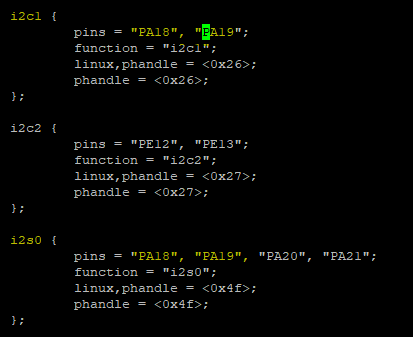Search the Community
Showing results for tags 'orangepizero'.
-
Orange Pi Zero NAS Expansion Board with SATA, mSATA using internal HUB USB with UASP capable chip, 2x USB and AV Port more info in this cnx-software post: http://www.cnx-software.com/2017/01/19/orange-pi-zero-nas-expansion-board-with-sata-usb-and-av-port-sells-for-10-shipped/ I want to share this new expansion board to read some interesting feedback here.
-
Hi , there I have RT kernel on my OrangePi Zero now. Linux orangepizero 4.14.8-rt9-sunxi #1 SMP PREEMPT RT Sat Jan 6 14:36:31 CET 2018 armv7l armv7l armv7l GNU/Linux Guru, please, HELP me to reconfigure it to using MIDI + Pure Data!!! ALSA is fully installed. But there's a problem: root@orangepizero:~# aconnect -i ALSA lib seq_hw.c:466:(snd_seq_hw_open) open /dev/snd/seq failed: No such file or directory can't open sequencer Thank in advance.
-
Hi, Recently I have installed "Armbian_5.75_Orangepizero_Debian_stretch_next_4.19.20" on my OrangePi Zero . I configured both Ethernet and wifi connection but I had a problem with the wifi, my board does have an IP address but I can not connect through ssh nor pinging that IP. The connection is Ok and I can get access to internet but I can not ping from any other devices on the network (error Destination host unreachable), But I noticed that if I ping (from the orangepi board ) the host machine then I will be able to connect through ssh to that IP. I dont know if its a problem with arp last thing that I tried was to disable the network manager but I still have the same issue.
-
Hello I have installed the iso in debian 8 (jessie). I would like to update to debian 9 but on armbian-config, i don't find the menu NEXT on submenu system Where i can find the latest kernel for update manually? my card is an orange pi zero Thanks for all and sorry for my bad english (french) David
-
I am trying to set up Wifi AP on OrangePi Zero board. Basically, I install and configure hostapd and dnsmasq and create a script, which does the following (it is run as sudo): nmcli radio wifi off rfkill unblock wlan ifconfig wlan0 172.16.0.1 netmask 255.255.255.0 broadcast 172.16.1.255 service dnsmasq restart /usr/sbin/hostapd /etc/hostapd/hostapd.conf This is the /etc/dnsmasq.conf: port=53 domain-needed bogus-priv resolv-file=/etc/dnsmasq/resolv.conf interface=wlan0 listen-address=172.16.0.1 bind-interfaces addn-hosts=/etc/dnsmasq/hosts.conf dhcp-range=172.16.0.50,172.16.0.150,12h dhcp-leasefile=/var/lib/misc/dnsmasq.leases domain=orangepi.wifi no-resolve server 8.8.8.8 server 8.8.4.4 local=/orangepi.wifi/ I also have in /etc/dnsmasq/resolv.conf: nameserver 127.0.0.1 And in /etc/dnsmasq/hosts.conf: 172.16.0.1 orangepi.wifi 172.16.0.1 www.orangepi.wifi So... I run the script, SSID appears, and I can connect to the OrangePi Access Point. I get the IP address (within DHCP range), from OrangePiI can ping the connected device, and from the device I can ping OrangePi (ping 172.16.0.1). From the device I can ping 8.8.8.8, but if I try to ping www.google.com, DNS resolving does not work. (From OrangePi internet is working good). I assumed ther eis some problem with Dnsmasq, so I installed udhcpd instead, but the problem is the same. Any idea?
-
Dear Armbian friends, I have question about add DS18B20 temp sensor at RPi-Monitor (web based interface). Can somebody paste working config of this sensor? On internet I found many tutorials but with DHT sensors. On this page (Xavier is an author of RPi-Monitor I think) is described DS18B20 but in status "Working in progress". I tried this but without luck. https://xavierberger.github.io/RPi-Monitor-docs/32_sensors.html?highlight=ds18b20 Cheers, Lucas
-
Hi all, its probably something simple but here is what i am struggling with: airmon-ng start <interface name> iwconfig wlan1mon channel 13 aireplay-ng --test wlan1mon ifconfig wlan0 up -> wlan0 is configured and connected to the access point packets are injected and can be observed with another machine ifconfig wlan0 down / or not associated with network packets are not injected and cannot be observed aireplay-ng or raw socket directly shows no errors initial toughs somewhere there is a switch to enable/disable radio at low level nothing obvious in strace tried with and without network manager. tried with internal and 2 external wifi adapters at lest one has to be associated advice on next steps tracing this down is appreciated realized while writing this that channels might be an issue and indeed only channels 12,13 are affected iw reg get global country 00: DFS-UNSET iw reg set JP iw reg get global country JP: DFS-JP and it works like dream it seems all I needed is rubber duck to get through this one - thanks to the forum and maybe someone will find this helpful
-
Hi, How to enable TV-OUT on Orange Pi Zero in Armbian mainline ( 4.19.20 - 5.75)??? I saw a post from one year ago with a patch that adds an overlay called tve, but is there a more integrated solution by now? Thank you
-
Hi, I just got my hands on a Orange Pi Zero, but when I try to use iscsiadm I get the following message: iscsiadm: iSCSI driver tcp is not loaded. Load the module then retry the command. iscsiadm: Could not perform SendTargets discovery: iSCSI driver not found. Please make sure it is loaded, and retry the operation I have tried to load the module using modprobe, but it does not seem to exist. Any tips?
-
I downloaded Armbian_5.59_Orangepizero_Ubuntu_xenial_default_3.4.113.img, and am running it with a 16GB SD card. I am trying to modify the I2C settings, however, when I type `armbian-config`, and select `System`, there is no "Hardware" menu option. This contradicts the documentation: Hardware is supposed to be an option in that menu. This is the current content of the /boot/armbianEnv.txt: verbosity=1 console=both overlay_prefix=sun8i-h3 overlays=usbhost2 usbhost3 rootdev=UUID=54dfde69-e472-48dd-a099-636a963154f3 rootfstype=ext4 usbstoragequirks=0x2537:0x1066:u,0x2537:0x1068:u
-
hi freinds i'm trying to use a dht22 to read temperature and humidity , with Armbian 5.65 (stretch) 4.14.78-sunxi and orenge pi zero orange pi state like this /etc/modules-load.d/modules.conf #gpio sunxi #gc2035 wire wl-sunxi wl-gpio wl-therm #sunxi-cir #xradio_wlan g_serial #xradio_wlan i2c -dev /etc/default/cpufrequtils ENABLE=true MIN SPEED=6000000 MAX_SPEED=1200000 GOVERNOR=interactive /boot/armbianEnv.txt verbosity=1 logo=disabled console=both disp_mode=1920x1080p60 overlay prefix=sun8i-h3 overlays=usbhost2 usbhost3 12c0 wl-gpio rootdev=WID=55cee3e8-79d6-4dd3-ab14-99274fo626cb rootfstype=ext4 param wl_pin=PA10 param wl_pin int_pullup=1 usbstorageguirks=0x2537:0x1066:u,0x2537:0x1068:u and im trying with this code https://www.piprojects.xyz/temperature-sensor-orange-pi-python-code/ and https://community.home-assistant.io/t/extend-dht-sensor-for-orange-pi/39838 from pyA20.gpio import gpio from pyA20.gpio import port #import RPi.GPIO as GPIO import dht22 import time import datetime # initialize GPIO #gpio.setwarnings(False) #gpio.setmode(GPIO.BCM) PIN2 = port.PA6 gpio.init() #gpio.cleanup() # read data using pin 14 instance = dht22.DHT22(pin=PIN2) while True: result = instance.read() if result.is_valid(): print("Last valid input: " + str(datetime.datetime.now())) print("Temperature: %.2f C" % result.temperature) print("Humidity: %.2f %%" % result.humidity) time.sleep(1) dht22 work correct with raspberry and rasbian also test ds18b20 with orange pi and work good but i need humidity sensor i dont know what's the problem??!! Thanks for any help
-
Dear Armbian Friends, My temperature sensor is not detected by board. Can somebody give me some advice what should I chceck / change / test now? Cheers! Lucas I tried: - another sample of DHT11 - changed cables to different ones - changed - both tested sensors were connected with 4.7k resistor between positive and data cable - tried different system versions like bionic, stretch and now jessie - tried to load modules via /etc/modules-load.d/modules.conf g_serial w1-sunxi w1-gpio w1-therm - or with /boot/armbianEnv.txt (disabling loading with modules.conf) wverbosity=1 logo=disabled console=serial disp_mode=1920x1080p60 overlay_prefix=sun8i-h3 overlays=usbhost2 usbhost3 w1-gpio param_w1_pin=PA10 param_w1_pin_int_pullup=1 rootdev=UUID=9cecf84e-027e-40ad-b711-ae5d323d9043 rootfstype=ext4 usbstoragequirks=0x2537:0x1066:u,0x2537:0x1068:u - tried to change data pin from GPIO10 (number 26) to GPIO 15 MOSI (number 19) Below some info about my system. sysadm@orangepizero:~$ ls /sys/bus/w1/devices/ w1_bus_master1 sysadm@orangepizero:~$ cat /sys/devices/w1_bus_master1/w1_master_slave_count 0 sysadm@orangepizero:~$ dmesg | grep wire [ 7.802453] Driver for 1-wire Dallas network protocol. [ 7.807173] gpio-10 (onewire@0): enforced open drain please flag it properly in DT/ACPI DSDT/board file sysadm@orangepizero:~$ sudo cat /sys/kernel/debug/gpio [sudo] password for sysadm: gpiochip0: GPIOs 0-223, parent: platform/1c20800.pinctrl, 1c20800.pinctrl: gpio-10 ( |onewire@0 ) in lo gpio-17 ( |orangepi:red:status ) out lo gpio-20 ( |vcc-wifi ) out hi gpio-166 ( |cd ) in lo gpio-204 ( |usb0_id_det ) in hi IRQ gpiochip1: GPIOs 352-383, parent: platform/1f02c00.pinctrl, 1f02c00.pinctrl: gpio-358 ( |vdd-cpux ) out hi gpio-359 ( |reset ) out hi gpio-362 ( |orangepi:green:pwr ) out hi sysadm@orangepizero:~$ uname -a Linux orangepizero 4.19.17-sunxi #5.73 SMP Mon Jan 28 21:06:40 CET 2019 armv7l GNU/Linux sysadm@orangepizero:~$ cat /etc/issue Debian GNU/Linux 9
-
Hello! In this topic: It was confirmed that more than 1 pin GPIO can be used for 1-wire bus. How can I edit or create my sun8i-h3-w1-gpio.dts for this? Can anyone give an example? Thank you in advance!
-
Hello. When my orange pi zero is booted, Pin16,18(PA19,PA18) seems to record high value(3.3v) I want the pins to stay low. In the dtb file, PA18 and PA19 are assigned to i2c1 and i2s0. But in the /boot/armbianEnv.txt file those overlays are not enabled. Can someone please help me how to keep ping 16 and 18 low at t he boot time? Image used: ARMBIAN 5.38 stable Ubuntu 16.04.4 LTS 4.14.18-sunxi Thank You.
-
Problem was, that via same file /etc/rc.local was started dnsmasq which crashed and rc-local.service didn't continue with starting wvdial , Hello All, Could someone please help me to start command wvdial during booting-process? When I star wvdial command from command line, LTE USB modem is started and ppp0 interface is activated and everything works fine, but I want it to be started automatically during booting-process. I tried add wvdial to end of file /etc/rc.local, but wasn't successful. I also tried to add record to file /etc/network/interfaces as: auto ppp0 iface ppp0 inet wvdial None of these mentioned above helped. After the start of network, interface ppp0 wasnt present. Thank you very much! Marek
-
Hi, I'm trying to interface a USB module via the usb pins (USB-DM2 and USB-DP2 - Pin 3 and 4 on the 13-pin header) and powered by the 5V and GND pin (Pin 1 and 2 on the 13-pin header) on the Orange Pi Zero board. During startup/reboot of the Orange Pi Zero, the module fails to get recognised and come up( output of lsusb and dmesg do not show any usb devices). The module, however gets recognised and works fine when plugged out and back in. Are there any extra steps that I have to take in order to make the module get recognised during bootup? Any help regarding the matter would be appreciated. Thanks in advance!
-
I have a new OPIz running ARMBIAN 5.70 stable Debian GNU/Linux 8 (jessie) 3.4.113-sun8i with Pihole version 4.1 (latest). The Opi is connected only with eth0 with a static IP address. Its running a 32G sandisk Ultra (class 10) with a verified image using Etcher. The CPU is running at around 59c. It's unusable because the OPi keeps losing connectivity. Usually about every 12-24 hours but more frequently at times (sometimes two or three times an hour). So no ping, no ssh, no telnet. Ive implemented some scripts on the OPi to try and track down what's happening. But the first thing I notice is syslog gets cleared and/or has large gaps in it. Maybe this is because the log isnt written to disk, and because I usually have to pull the power to recover it, I lose the data? But if so how can I reliably log messages to get a clue as to what's happening? So for example, after another similar failure, syslog now contains nothing before 12:17. While only yesterday it had entries going back for days. It's been erased. And after every failure part or all of it gets erased. I can sometimes catch it OPi going offline in syslog, as follows: Jan 24 14:17:22 localhost systemd[1411]: Reached target Sockets. Jan 24 14:17:22 localhost systemd[1411]: Starting Basic System. Jan 24 14:17:22 localhost systemd[1411]: Reached target Basic System. Jan 24 14:17:22 localhost systemd[1411]: Starting Default. Jan 24 14:17:22 localhost systemd[1411]: Reached target Default. Jan 24 14:17:22 localhost systemd[1411]: Startup finished in 57ms. Jan 24 14:17:23 localhost systemd[1]: Started User Manager for UID 1000. Jan 24 14:17:23 localhost NetworkManager[802]: <info> (wlan0): supplicant inter face state: disconnected -> inactive Jan 24 14:17:23 localhost sSMTP[875]: Sent mail for root@PiHole (221 2.0.0 clos ing connection r130sm29540290pfr.48 - gsmtp) uid=0 username=root outbytes=330 Jan 24 14:17:23 localhost NetworkManager[802]: <info> NetworkManager state is n ow DISCONNECTED Jan 24 15:09:52 localhost systemd[1411]: Time has been changed Jan 24 15:09:52 localhost rsyslogd-2007: action 'action 17' suspended, next ret ry is Thu Jan 24 15:10:22 2019 [try http://www.rsyslog.com/e/2007 ] Jan 24 15:09:52 localhost systemd[1250]: Time has been changed Jan 24 15:09:52 localhost systemd[1]: Time has been changed Jan 24 15:09:53 localhost CRON[1567]: (root) CMD ( [ -x /usr/lib/php5/sessionc lean ] && /usr/lib/php5/sessionclean) Jan 24 15:09:53 localhost CRON[1568]: (root) CMD (/home/colic/scripts/loadMon.s h) Jan 24 15:09:53 localhost loadMon: Im alive and I pinnged the Gateway. Temp is 64 c Jan 24 15:09:57 localhost dhcpcd[1150]: eth0: no IPv6 Routers available Jan 24 15:10:01 localhost CRON[1619]: (root) CMD ( PATH="$PATH:/usr/local/bin /" pihole updatechecker local) Jan 24 15:10:01 localhost CRON[1620]: (root) CMD (/home/colic/scripts/loadMon.s h) Jan 24 15:10:01 localhost loadMon: Im alive and I pinnged the Gateway. Temp is 58 c For the above log entries my PC script was able to contact (ping & ssh) OPi until 14:45 (so ping and ssh were working from 14:17 to 14:45) when it reported a ping failure. At 15:08 I recover by power cycling, and you see the boot sequence beginning. But every time I recover the Opi, it appears to work perfectly normally except for tampering with its audit trail in syslog! Ive used two different 2A power supplies, and two ethernet cables (since twice I was able to recover by unplugging it and replugging - although usually this does nothing). So my question is, what is going on with syslog and how do I get it reliably retaining the logger messages I send to it?
-
We have deployed the zero for an integrated MCU on one of our products, and in rare occasions we are experience random lockups of the MCU (possibly related to overheating). Its pretty much impossible to debug this since it happens very rarely, but we are trying to mitigate all possible causes. The MCU is controlling a bigger and more expensive board and a fan. If there are internal failsafes that are being triggered by the MCU and locking it up (like temp) we want to disable as many of them as possible (we would rather have the MCU burn up than our main board). Anyone have any insights on orange pi zero OTP or OCP in kernel or uboot parameters we can disable?
-
Hello. Armbian_5.35_Orangepizero_Ubuntu_xenial_default_3.4.113.7z Orange Pi Zero 256 I am rading the bootlog via serial console. [FAILED] Failed to start Load Kernel Modules. See 'systemctl status systemd-modules-load.service' for details. # systemctl status systemd-modules-load.service â systemd-modules-load.service - Load Kernel Modules Loaded: loaded (/lib/systemd/system/systemd-modules-load.service; static; vendor preset: enabled) Drop-In: /lib/systemd/system/systemd-modules-load.service.d ââ10-timeout.conf Active: failed (Result: exit-code) since Sun 2018-12-30 00:20:40 CET; 3min 8s ago Docs: man:systemd-modules-load.service(8) man:modules-load.d(5) Process: 167 ExecStart=/lib/systemd/systemd-modules-load (code=exited, status=1/FAILURE) Main PID: 167 (code=exited, status=1/FAILURE) Warning: Journal has been rotated since unit was started. Log output is incomplete or unavailable. Warning: systemd-modules-load.service changed on disk. Run 'systemctl daemon-reload' to reload units. # journalctl -f -b _PID=167 -- Logs begin at Sun 2018-12-30 00:20:45 CET. -- Dec 30 00:20:45 opi-06-app-c13 systemd-modules-load[167]: Failed to insert 'xradio_wlan': Connection timed out Dec 30 00:20:45 opi-06-app-c13 systemd-modules-load[167]: Inserted module 'g_serial' Dec 30 00:20:45 opi-06-app-c13 systemd-modules-load[167]: Inserted module 'xradio_wlan' ^C # cat /etc/modules #w1-sunxi #w1-gpio #w1-therm #sunxi-cir xradio_wlan g_serial xradio_wlan If I remove any xradio_wlan, then wlan0 is not available at boot. Is there a way to fix the boot error message, without loosing wlan0 ? Obviously, some one is aware of an issue, because some dev has put the same line twice in modules ...
-
I had it and lost it: u-boot with I2C. I did not write down how I did it (was heavy) Tried to build yourself again: does not work. u-boot-mizi.bin does not want to boot. For 2 days I try to find the solution. Google has already blocked me Can somebody help? I need i2c directly, after power on, to read FRAM and set relays. Programming in Linux is enjoyable but system administration is horrible. Thanks
-
I am trying to set up a Orange Pi Zero to use as a small NAT/ Bridge Device. I want to use an Android phone in USB tether mode to give its 4g connection to an interface on the opi zero then use a network bridge to join the 4g connection to the lan port, also the opi zero is gonna run a small section of code on the USB interface that changes the TTL of all packets through the interface. On my linux mint box the script looks like pkexec sysctl net.ipv4.ip_default_ttl=65 && echo 65 | pkexec tee /proc/sys/net/ipv4/ip_default_ttl but i am running into issues with the very first part, that is getting my phone native USB tether to be recognized as an interface in the kernel. I understand that a kernel module, I believe g_ether, needs to be installed to get this functionality. All the posts I have seen use this module to make the opi run as the HOST and not the client. Also i am new to modifying the kernel in this way so if someone knows how to do it on this distro it would be greatly appreciated. System info: ARMBIAN 5.65 stable Ubuntu 18.04.1 LTS 4.14.84-sunxi Output of lsusb of the phone when in tether mode Bus 003 Device 004: ID 0e8d:2004 MediaTek Inc. Couldn't open device, some information will be missing Device Descriptor: bLength 18 bDescriptorType 1 bcdUSB 2.00 bDeviceClass 224 Wireless bDeviceSubClass 0 bDeviceProtocol 0 bMaxPacketSize0 64 idVendor 0x0e8d MediaTek Inc. idProduct 0x2004 bcdDevice ff.ff iManufacturer 2 iProduct 3 iSerial 4 bNumConfigurations 1 Configuration Descriptor: bLength 9 bDescriptorType 2 wTotalLength 75 bNumInterfaces 2 bConfigurationValue 1 iConfiguration 0 bmAttributes 0xc0 Self Powered MaxPower 500mA Interface Association: bLength 8 bDescriptorType 11 bFirstInterface 0 bInterfaceCount 2 bFunctionClass 224 Wireless bFunctionSubClass 1 Radio Frequency bFunctionProtocol 3 RNDIS iFunction 19 Interface Descriptor: bLength 9 bDescriptorType 4 bInterfaceNumber 0 bAlternateSetting 0 bNumEndpoints 1 bInterfaceClass 224 Wireless bInterfaceSubClass 1 Radio Frequency bInterfaceProtocol 3 RNDIS iInterface 17 ** UNRECOGNIZED: 05 24 00 10 01 ** UNRECOGNIZED: 05 24 01 00 01 ** UNRECOGNIZED: 04 24 02 00 ** UNRECOGNIZED: 05 24 06 00 01 Endpoint Descriptor: bLength 7 bDescriptorType 5 bEndpointAddress 0x82 EP 2 IN bmAttributes 3 Transfer Type Interrupt Synch Type None Usage Type Data wMaxPacketSize 0x0008 1x 8 bytes bInterval 9 Interface Descriptor: bLength 9 bDescriptorType 4 bInterfaceNumber 1 bAlternateSetting 0 bNumEndpoints 2 bInterfaceClass 10 CDC Data bInterfaceSubClass 0 Unused bInterfaceProtocol 0 iInterface 18 Endpoint Descriptor: bLength 7 bDescriptorType 5 bEndpointAddress 0x81 EP 1 IN bmAttributes 2 Transfer Type Bulk Synch Type None Usage Type Data wMaxPacketSize 0x0200 1x 512 bytes bInterval 0 Endpoint Descriptor: bLength 7 bDescriptorType 5 bEndpointAddress 0x01 EP 1 OUT bmAttributes 2 Transfer Type Bulk Synch Type None Usage Type Data wMaxPacketSize 0x0200 1x 512 bytes bInterval 0
-
Hi everyone. I have a opz with H2+ and expansión board. I had installed Jessie before. And now, I upgraded to stretch. why espeak-ng sounds so bad?? in jessie that did not happen.
-
Hello guys, soon I will receive this nice toy (512MB) and I want to be prepared for my project: a domestic vpn server (using pptp) serving 1 o 2 guests at most. For this project I just need the RJ45 socket thus I would like to switch off as much as possible (e.g. GPU, on board wifi and others if there). Someone can point me to some resources or list what I can do to accomplish this? P.S. I know that pptp is not as secure as IPSec (and maybe IPSec is heavier for such device) but for the purpose of my project it is enough. Thanks a lot Gianni
-
Hi, I'm using fbtft with legacy kernel in orange pi zero to be able to use 3.5 inch raspberry LCD with ILI9486 (not sure). Everything works and I can get image from the LCD (although it is terribly slow). But I have one big problem. LCD freezes after some time or when screen screen changes or even sometimes during initialization . Is there anything wrong with the spi driver in armbian ? How can I get over this issue ? I'm sure there is nothing wrong with the lcd because I have tested same lcd on raspberry pi and I have about 500 of these lcds for a project. This is the my fbtft options : modprobe fbtft_device custom name=fb_ili9486 gpios=dc:18,reset:2 busnum=1 speed=8000000 txbuflen=32768 rotate=270 fps=1
-
The orange pi zero has a USB OTG interface, which can be used to interact with it in the absence of networks and spare USB-UART converters. This is not enabled by default in the Armbian image. Here I describe how to modify the system image before first boot to enable this. First, mount the freshly written SD card on a linux computer, become root, and change directory to the mount point, that is, the root directory of the SD card. The following couple of steps were taken from https://oshlab.com/enable-g_serial-usb-otg-console-orange-pi-armbian/which describes how to enable this in a live system, i.e. after first boot. The steps are modified to work on the mounted SD card image. Basically, the first slash before etc is removed. echo "g_serial" >>etc/modules echo "ttyGS0" >>etc/securetty mkdir etc/systemd/system/serial-getty@ttyGS0.service.d Create new file etc/systemd/system/serial-getty@ttyGS0.service.d/10-switch-role.conf with contents [Service] ExecStartPre=-/bin/sh -c "echo 2 > /sys/bus/platform/devices/sunxi_usb_udc/otg_role" The guide for the live system then calls systemctl enable which you cannot do here since the system to be modified is not running and you can also not chroot into it because of the ARM architecture. Instead, duplicate that command's effect by creating a symlink: ln -s /lib/systemd/system/serial-getty@.service etc/systemd/system/getty.target.wants/serial-getty@ttyGS0.serviceNote there is a slash before lib, but again no slash before etc. Now unmount the sd card, insert into the orangepizero, power it from a USB port of your computer, or, to be safe, put a powered USB hub between your computer and the orangepizero. Wait for the orangepizero to cycle through its first automatic reboot. You can recognize the reboot by the simultaneous flashing of the RJ45 LEDs. Now you can establish the serial connection with screen /dev/ttyACM0 115200 and login as root from there. May also work for other boards with USB OTG.







